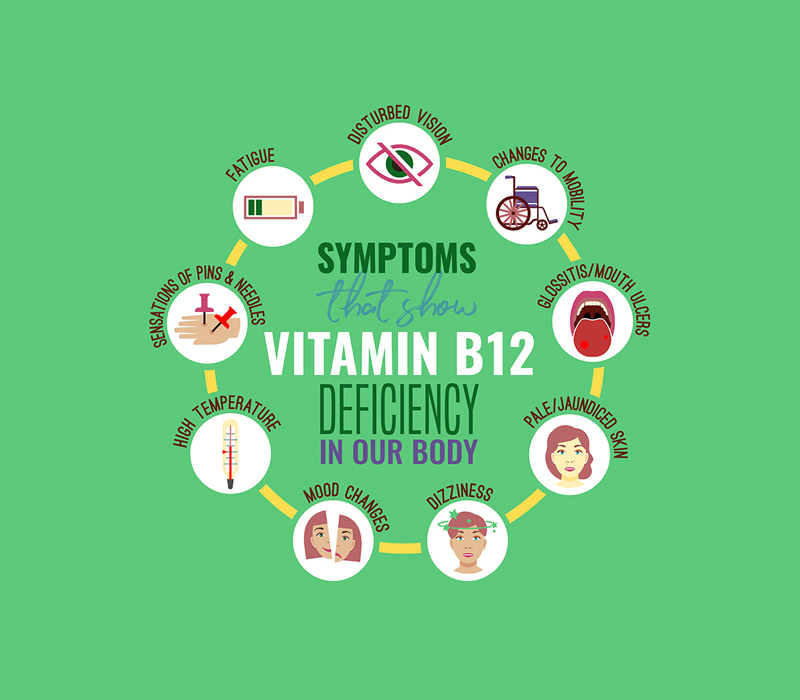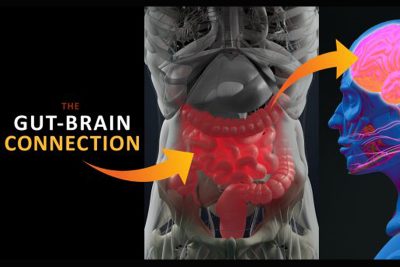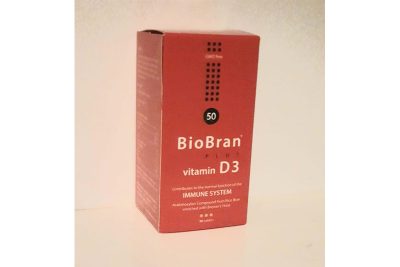Vitamin B12

Vitamin B12 is a neuroprotective, water-soluble vitamin that is naturally found in animal products including fish, meat, poultry, eggs, milk, and milk products. Vitamin B12 is generally not present in plant foods, but fortified breakfast cereals are a readily available source of vitamin B12 with high bioavailability for vegetarians. Some nutritional yeast products also contain vitamin B12. It is available as a dietary supplement and a prescription medication. Vitamin B12 exists in several forms and contains the mineral cobalt, so compounds with vitamin B12 activity are collectively called “cobalamins”. Methylcobalaminand 5-deoxyadenosylcobalamin are the forms of vitamin B12 that are active in human metabolism.
Vitamin B12 is required for proper red blood cell formation, neurological function, and DNA synthesis. A deficiency is characterised by megaloblastic anaemia, fatigue, weakness, constipation, loss of appetite, and weight loss. Neurological changes, such as numbness and tingling in the hands and feet, can also occur. Additional symptoms of vitamin B12 deficiency include difficulty maintaining balance, depression, confusion, dementia, poor memory, and soreness of the mouth or tongue. Low levels of B12 have been associated with peripheral neuropathy, cognitive impairment, and more rapid rate of disease progression in Parkinson’s.
The neurological symptoms of vitamin B12 deficiency can occur without anaemia, so early diagnosis and intervention is important to avoid irreversible damage.
A compelling amount of research demonstrates that most people with Parkinson’s symptoms have a serious deficiency of B vitamins, especially vitamin B12 and that the levels are lower in patients with Parkinson’s compared with people without the condition.
An active form of vitamin B12 called AdoCbl (5’-deoxyadenosylcobalamin) can reduce the effects of dopamine loss in Parkinson’s disease caused by genetic mutations in the LRRK2 gene, a study suggests. AdoCbl is approved by the U.S. Food and Drug Administration. To explore AdoCbl’s therapeutic potential, the team next administrated it in worms carrying the G2019S mutation. The experiments revealed that AdoCbl treatment could prevent the death of dopamine-producing nerve cells and prevent the manifestation of symptoms associated with neurodegeneration. Additional analysis also revealed that AdoCblcould prevent neurotoxicity and dopamine deficits in fly and mouse models carrying different LRRK2 mutations associated with Parkinson’s.
Identification of vitamin B12 as a modulator of LRRK2 activity “constitutes a huge step forward because it is a neuroprotective vitamin in animal models and has a mechanism unlike that of currently existing inhibitors,” Iban Ubarretxena, director of the Biofisika Institute and co-author of the study, said in a press release. “[This active form of vitamin B12] could be used as a basis to develop new therapies to combat hereditary Parkinson’s associated with pathogenic variants of the LRRK2 enzyme,” he added.
Not only does these finding mean that this form of vitamin B12 could be used as the basis for developing new therapies for treating Parkinson’s, but it makes vitamin B12 a viable preventative measure to reduce the risk of Parkinson’s.
It is important to adopt a healthy, well balanced diet which pays attention to the nutrient deficiencies commonly associated with Parkinson’s, such as vitamin B12. Regular testing of vitamin levels is recommended and low levels of vitamin B12 could be used as a biomarker for early detection in Parkinson’s, which is extremely useful for improving quality of life.



